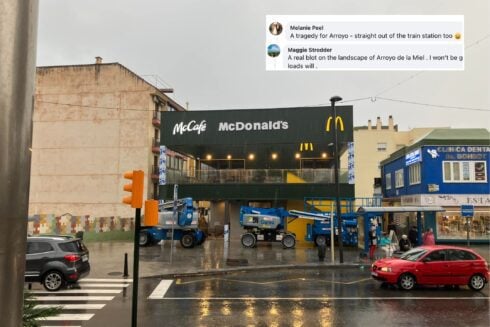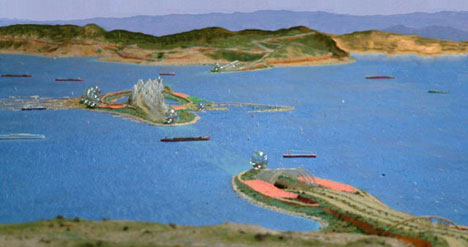As the Slow Food Movement starts to make inroads in northern Spain, Dick Handscombe travels to Italy to find out how to spread its message in Andalucia
OVER the last century Europe has lost up to 90 per cent of its traditional food diversity. Much to the detriment of the quality of food we eat, it is also highly damaging to the local economy.
It was for this reason that Italian journalist Carlos Petrini set up the Slow Food Movement in 1986.
Fed up with the way his favourite food dishes had lost their traditional rich flavours due to industrialised farming, he wanted an antidote to bland, Fast Food.
Spurred on by the opening of a branch of McDonalds in the celebrated Piazza de Spagna, in Rome, he organised a series of demonstrations to oppose it.
Two decades later and the Slow Food Movement has groups in 132 different countries and counts 85,000 members worldwide. In the UK there are 100 separate groups (or conviviums, as they are known) – with, so far, around 30 in Spain.
The group increasingly takes on fast food companies and the big agribusinesses and fights to preserve and expand the availability of traditional foods and farming methods.
Nowhere is it more needed than in Spain.
With the growth of industrialised fishing and farming here, there is a big fight to ensure that small scale producers can continue growing by ecological means and with traditional seeds and breeds.
One only has to look at the huge profits made by supermarkets and middle men to recognise the problem. It also explains why local farmers markets and weekly box deliveries are growing ever popular.
There is also the problem of ensuring that the ever dwindling areas of good fertile land is not converted into non-productive golf urbanisations, shopping centres, airports and more housing.
Through my series of books on the growing of fruit and vegetables in Spain I was invited to this year’s international conference on Slow Food in Turin.
I had first found out about the Slow Food Movement four years ago while on a walking holiday with my wife Clodagh in Tuscany. We trekked for a week through the Chianti hills enjoying local wines and foods in local bodegas.
At the best, at Le Cantine, in Greves, we learnt how the local wine industry and other artisan products were being supported by the group. One cheesemaker had just come back drom the 2004 Slow Food conference and regaled us with facts and figures about the amazing group.
We joined as soon as we got home and this year it was my turn to attend the conference, called Terra Madre, which conveniently coincides with the Piedmont food fair called the Salone de Gusto ‘Saloon of Taste’.
For five days last month I was able to experience the commitment, ambitions and frustrations of the 8000 participants from over 150 countries attending.
Some five days of continuous seminars, workshops, and orderly tastings, I learnt about global food problems and the possible solutions.
A few things really stuck out. The current desire for out of season produce and industrialised agriculture is using the equivalent of 50 times the whole supply of water in the Nile every year. It is also causing huge water shortages for the local rural populations of third world countries.
I also learnt of the enormous potential in regenerating artisan agricultural methods both in small holdings and in our own backyards. On our farm, for example, we are already managing to sell to our local Michelin-Starred restaurant.
Interestingly it also turns out that the new President of the USA, Barack Obama has shown interest in the health and economic benefits of the existing American Slow Food network.
The organisation has been so slick over recent years that even Prince Charles had his own stall at the fair (albeit represented by a cardboard cutout). The Prince, who gave a keynote speech in 2006, sent a particular message of goodwill this year. Representing his increasingly popular organic brand Duchy Originals, he said: “Slow Food has been invaluable in encouraging sustainable agriculture and in safeguarding the traditions associated with quality food products.”
With around 180,000 aspiring gastronomes landing in one venue, the Salone de Gusto was really something else. For around 20 euros each we all took part in tutored tastings that included pickled carp to chocolate impregnated cheese!
After nine hours of workshops and seminars a day, not to mention almost constant eating, it was great to be back home in Spain where my wife and I are practicing what we preach.
As well as working intensively on our vegetable plot, we are picking wild asparagus brought out by the recent rains and caring for our trees with only organic products.
For dinner last night it was a home grown rocket, fennel and red lettuce salad accompanying a herby home-reared rabbit (no longer available from the local butcher), all washed down by a great local eco-wine from Los Pinos.
Closely following the Slow Food objective, this was all tasty ecological food from local sources with low food miles and with a fair reward to the grower.
Ultimately, our 15-year drive to achieve near self sufficiency has been worthwhile… and saves us a fortune, not to mention improves our health. I hope you will consider joining us.
Your countryside needs you! Who’s up for it?
NO growth enhancers, no steroids, no impurities, just old-style food, produced at the speed of Mother Nature. This is the objective of the Slow Food Movement, and it is incredible that while there are already 100 Slow Food Groups in the UK, Andalucia counts just two, both Spanish-led in Sevilla and Granada.
The Olive Press is hoping to support the launch of an expatriate-led group centred on a town such as Fuengirola, Tarifa or Alhaurin with members coming from all around the surrounding area.
What it means is for farmers and food lovers to get together to promote traditional local methods and to introduce them to an audience which wants the same, pure, natural products. Without the support of Slow Food, many artisan producers, growers and fishermen, would have had to cease production and amazing flavour sensations would have been lost.
Activities could include dinners, tapas competitions, expanding and promoting the local organic market, setting up workshops on using Slow produce in restaurants and home cooking, workshops on the marketing of Slow Produce, stimulating a greater stocking of local produce by local shops and supermarkets, the setting up and support of a school garden with the produce being used for cooking lessons and the school canteen and within a couple of years a Slow Food conference perhaps to eventually rival the one held annually in Bilbao.
Hopefully someone soon picks up the baton and the already amazing diversity of food, markets and restaurants in Andalucia can be consolidated and boosted.
Please contact jon@theolivepress.es if you are setting up such a group







